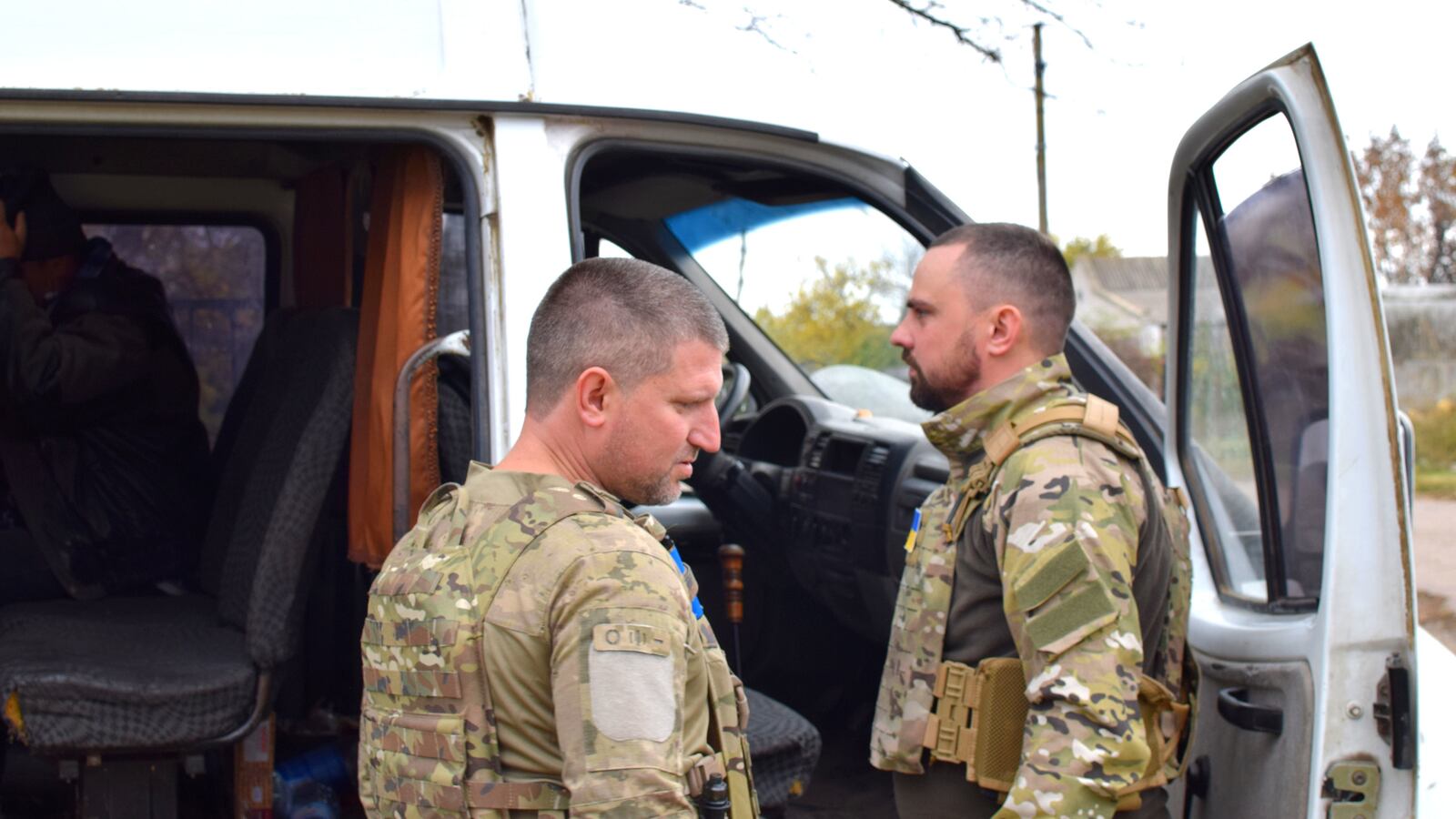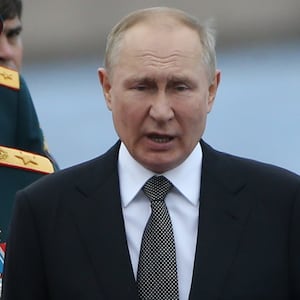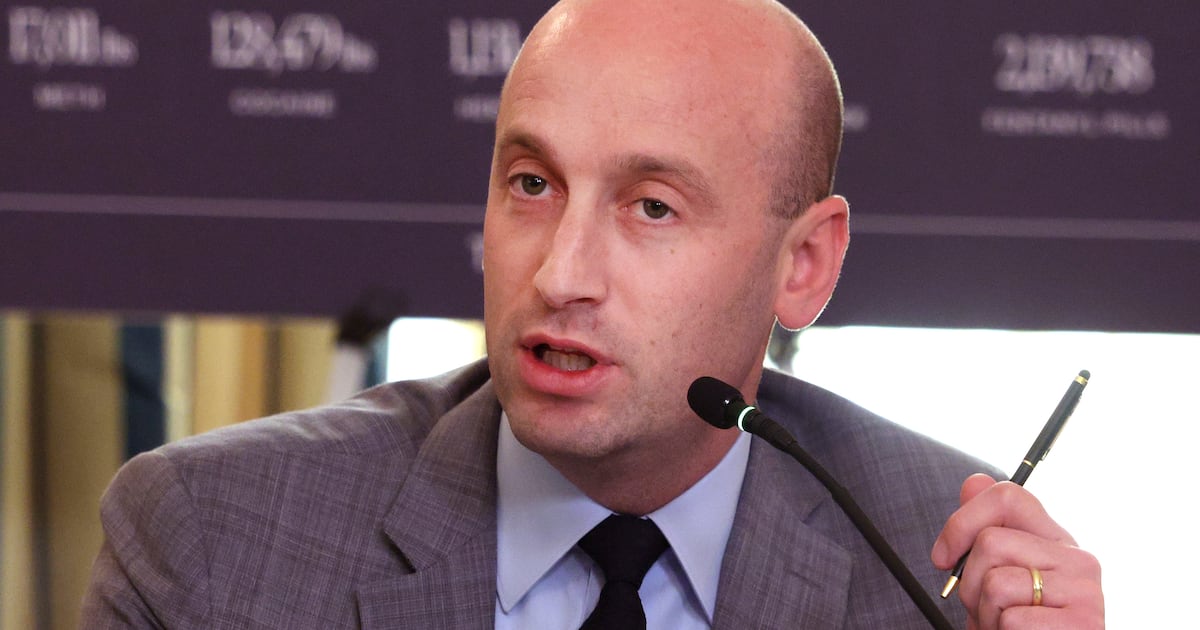DUDCHANY, Ukraine—The three Ukrainian refugees couldn’t see the drone, but they knew it was near. Somewhere up above them, its rotors were buzzing like a swarm of angry bees. “Is it ours?” a soldier in Ukraine's National Guard radioed to his comrades.
Seconds later, he ushered the three men to hide under the scant cover of a tree in the village of Dudchany. The drone was at most 500 meters away. No one spoke. After months of bombardment, the villagers from the settlement of Khakharovka knew that where drones flew, artillery strikes could well follow.
The whirr of the blades subsided, and the group relaxed, edging out of the tree cover on a recent cloudy day in southern Ukraine. Although it was still unclear whose drone it was, they had just had one more brush with the danger brought on by Russia’s invasion of Ukraine.
The three men, one of a group of refugees fleeing Russian-held territory in Ukraine’s southern Kherson region last week, were part of daring efforts by Ukrainian volunteers to evacuate civilians amid a Ukrainian offensive that began in August. That such civilians are willing to leave for Ukraine undercuts a key Russian talking point: that Ukrainians in the area are fleeing to Russia.
On Wednesday, 10 days after the refugees evacuation, Russia’s military announced it was withdrawing from the Kherson region entirely amid what they described as an untenable military position. But some Ukrainian officials have disputed the claim, with presidential adviser Mykhailo Podolyak saying that Ukraine sees no signs Russia is prepared to abandon Kherson without a fight.
The road to Dudchany runs along an unyieldingly flat landscape, a perfect setting for artillery. Its long green fields, once renowned for their watermelons, are now polka-dotted by shell holes that turn up the black dirt beneath.
Zooming along past bombed out villages in their aging Gazelle van one recent morning, volunteers Sergei Skoryk and Eduard Laktyonov are already well-experienced in these forms of evacuations. Working with local businessman and politician Ihor Yosypenko, who leads volunteer group “Ukraine Will Prevail,” they’ve made the journey to evacuate Kherson region residents to Ukraine many times.
All three are from Kherson region, a vast flat agricultural area in Ukraine’s south that fell to Russia in the first days of the war. Before the war Skoryk served as the director of a nature preserve, while bearded, jovial Lakyonov ran a prosperous car repair business. Their local connections are key to their work, from dealing with Russian soldiers to interacting with Ukrainian police.
Indeed, without these connections, their plan to get the refugees out of Russian-held territory would never have worked. On Yosypenko’s initiative, his contacts in occupied Kherson first approached Russian soldiers in the area to see if they’d let Ukrainians out in exchange for a bribe.
The Russians agreed, first charging 500 hryvnia a person, then 1,000, then 2,000 or around $50. Yosypenko said a local businessman acted as the bagman, with the cash going to a local senior Russian officer. The Russians were so eager for the cash they went door to door to advertise it, Yosypenko said in an earlier interview.
On the way down the volunteers made a brief stop at the village of Chervone, where they unloaded cases of food aid and water.

Refugees pile into a waiting van in Dudchany, Ukraine, October 31, 2022.
Photos courtesy of Sam SkoveIn this corner of Ukraine, everyone has a story of Russian occupation, which ended only in early October following a Ukrainian breakthrough. Tatiana Derchach, who took receipt of the aid, said she provided the Ukrainian army with the coordinates of Russian positions using her old flip phone. The Russians, who only inspected more modern smartphones, never suspected a thing.
When Ukrainian forces took the village, Derchach said she had tears in her eyes. “We waited so long for them.”
Skoryk and Laktyonov had no time to chat though. Within a few minutes, they were back on the road, tearing past burnt-out tanks and tree lines filled with hulking Ukrainian cannons.
Pulling into the village of Dudchany, the van was soon met by a crowd of refugees. In a sign of their desperation, few were carrying more than a large bag. “We left everything,” one woman said, interviewed the night before having made the same trip.
Just a short time earlier, they had left their home and driven to Russian positions on the other side of Dudchany, before crossing a half-sunken armored vehicle over into Russian positions.
The van, overstuffed with people, then peeled off, leaving four men behind to wait for its return to the seemingly empty village.

A destroyed tank on the way to Dudchany, Ukraine, October 31, 2022.
Photos courtesy of Sam SkoveAleksander and Volodymyr, who declined to give their last names, described a hellish occupation in the village of Karcharovka defined by Russian drunkenness and violence.
The Russians even locked up two men for five days for shouting pro-Ukrainian slogans, 32-year-old Alexander said. The two men were then forced to sing Russia’s national anthem every morning, he added.
Their defining feature, though, was alcoholism. Volodymyr recounted how one day he watched as a car of three Russians pulled up to a local grocery store. One of the soldiers popped out, evidently drunk. Walking among the waiting customers, he placed his pistol to their head. “Do you want to live?” he asked them, Volodymyr said. His two comrades eventually pulled him back to the car.
Aleksander and Volodymyr are far from the only Karcharovka residents to report such incidents. Interviewed separately the night before, other refugees told stories of drunkenness, the imprisonment of Ukrainian veterans, and at times absurd attempts to root out pro-Ukrainian sentiment.
Seeing a Ukrainian flag on the key fob of one 18-year old man, also named Volodymyr, Russians soldiers became angry. “Throw it out otherwise we’ll arrest you,” they said.
Sitting near the evacuation point, the constant boom of incoming and outgoing artillery is a terrifying reminder of why these refugees are fleeing. As the front moved closer, their village and the Russians staying there became the target of more and more artillery strikes, presumably from Ukraine.
"We were waiting, we thought our guys would come” said Tatiana, who declined to give her last name. As the artillery strikes became more intense, they made the decision to leave.
Just five days before a neighbor had died due to shellfire, Volodymr said, the first casualty in their village.
Soldiers offered some residents the opportunity to evacuate deeper into Russian-held territory, in line with Russian officials’ claims that it is conducting evacuations of the region. According to Russian official Vladimir Saldo, more than 70,000 civilians have left this way, a number contested by Ukrainian officials.

A ruined store on the way to Dudchany, Ukraine, October 31, 2022.
Photos courtesy of Sam SkoveThe refugees refused this option though.
The evacuation van finally pulled in, and the waiting men jumped in. Rattling back down the road, the van eventually reached a safer location where the refugees could speak with police before going onward to Kriviy Rikh, the nearest large Ukrainian city.
The volunteer’s day, though, wasn’t over. Over the radio came a call. There was another group of refugees waiting, one of them wounded.
Each trip, of course, increases the chance that a Russian shell will find its mark. On this third and final trip, one Russian artillery round passed so close above the waiting van that the whistling of it passing through the air could be heard before it detonated somewhere past the village.
Eventually the bloody, bandaged man appeared, his arm slung across another man who was helping him walk. Soon the van was driving back, first to drop off the man for treatment, and then on to the city of Kryvyi Rih.
Having started their day at 7 a.m., the volunteer team was now returning with sunset. “Are you tired?” a friendly policeman asked Laktyonov at a checkpoint outside the city. “A little,” he replied.
Skoryk and Lakyonov had one more job though. One woman among the refugees needed to get to the railway station. Having started her day in occupied Ukraine, she was now about to make one last trip. She’d be taking the overnight train to her son, in Kyiv.







